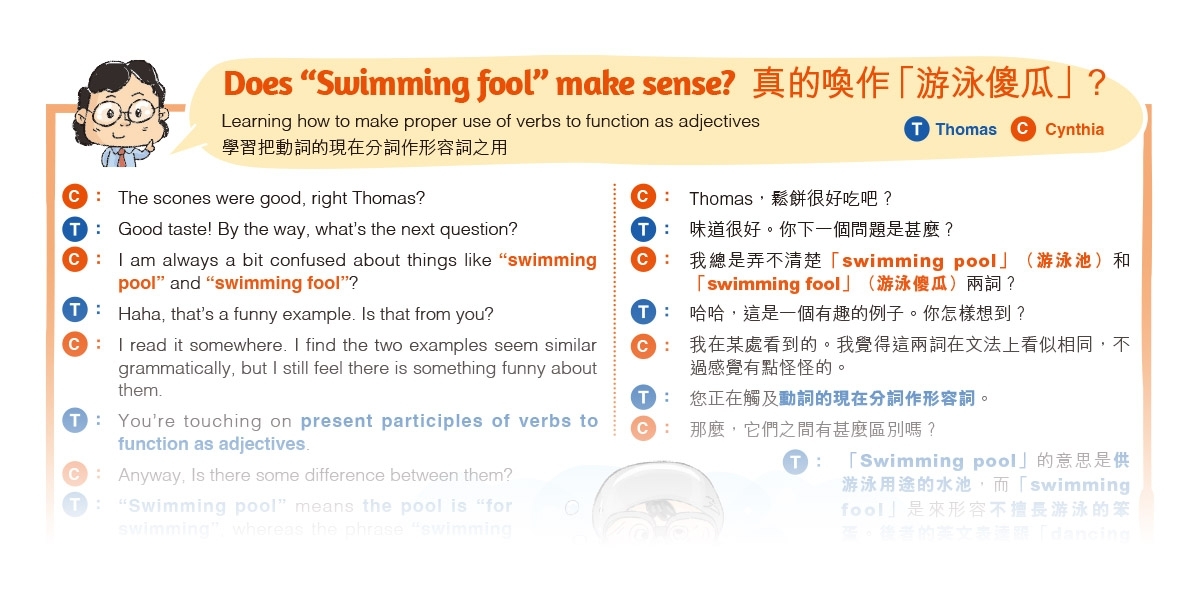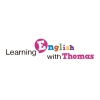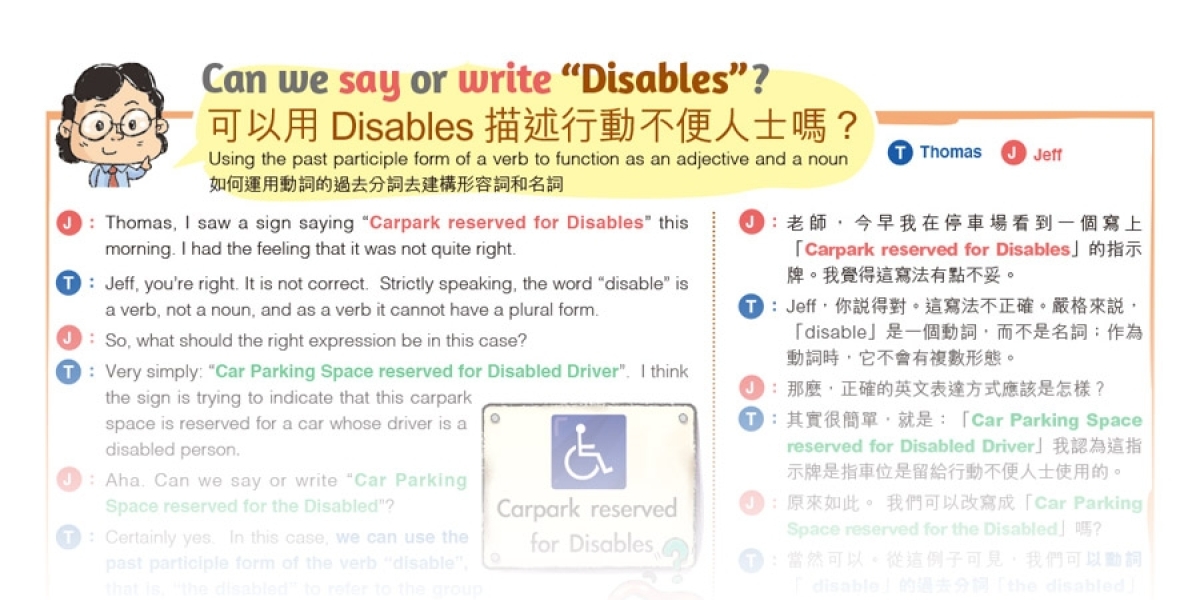昔日文章


Learning English with Thomas
2023.06.11
Does “Swimming fool” make sense?
真的喚作「游泳傻瓜」?
Learning how to make proper use of verbs to function as adjectives
學習把動詞的現在分詞作形容詞之用
T:Thomas C:Cynthia
C:The scones were good, right Thomas?
T:Good taste! By the way, what’s the next question?
C:I am always a bit confused about things like “swimming pool” and “swimming fool”?
T:Haha, that’s a funny example. Is that from you?
C:I read it somewhere. I find the two examples seem similar grammatically, but I still feel there is something funny about them.
T:You’re touching on present participles of verbs to function as adjectives.
C:Anyway, Is there some difference between them?
T:“Swimming pool” means the pool is “for swimming”, whereas the phrase “swimming fool” refers to a foolish person who is swimming. This second one is similar to such expressions as “dancing queen”; “winning candidate”; “skating idol”.
C:Hmm…That’s a new usage for me. Thanks so much!
C:Thomas,鬆餅很好吃吧?
T:味道很好。你下一個問題是甚麼?
C:我總是弄不清楚「swimming pool」(游泳池)和「swimming fool」(游泳傻瓜)兩詞?
T:哈哈,這是一個有趣的例子。你怎樣想到?
C:我在某處看到的。我覺得這兩詞在文法上看似相同,不過感覺有點怪怪的。
T:您正在觸及動詞的現在分詞作形容詞。
C:那麼,它們之間有甚麼區別嗎?
T:「Swimming pool」的意思是供 游泳用途的水池,而「swimming fool 」是來形容不擅長游泳的笨蛋。後者的英文表達跟「dancing queen」(跳舞皇后)、「winning candidate」(勝選的候選人); 和「skating idol」(滑冰偶像)類似。
C:嗯⋯⋯這些英語運用對我來說是新的知識。謝謝你!


Learning English with Thomas
2022.11.20
“Makes your home comes true” —— correct or not?
「Makes your home comes true」—— 是對,還是錯﹖
Correct use of the verb “make” with infinitives 正確使用英文動詞“Make”的不定式(infinitives)
T : Thomas t : Tony
T : Tony, morning! How are you doing lately?
t : Could be better.
T : You do sound troubled.
t : It’s only this crazy grammar making me fail in drill exercises all the time, especially using infinitives together with verbs like make, let, help, and so on. Can I show you a picture? Is the language there in this ad correct?
T : Ah, it reads “(something) Makes your home comes true”. It’s wrong grammatically, because when you use the verb make, like in this case, the other verb that comes after it must be an infinitive without “ to” and cannot be another main verb.
t : How should it be corrected?
T : It should be “(whatever that may be that) makes your home come true”. For one thing, there can only be one main verb in a sentence, so the other verb-like items must be either infinitives or participles.
t : Very clear now. Thanks so much!
T : 早晨,Tony!你近來好嗎?
t : 可以更好。
T : 聽起來你好像有煩惱。
t : 這些英文文法令我經常在作業練習中犯錯,尤其是使用動詞的不定式,如make、let、help等等。我想你幫我看看這圖片,相中的廣告的用語使用正確嗎?
T : 啊,上面寫著 「(某事)Makes your home comes true」。在語法上而言,這表達是錯誤的。因為當你使用動詞make時,它後面的另一個動詞必定是不定式,不能使用「to」,並且它不能充當另一個主要動詞。
t : 應該怎樣改寫﹖
T : 正確寫法應該是「makes your home come true」。 有一點必須謹記,英文句子中只能有一個主要動詞,因此在同一句子中貌似動詞的詞彙,必須以不定式(infinitives)或分詞(participles)形式出現。
t : 我現在很清楚了。感謝你的指導!


Learning English with Thomas
2022.10.30
Can we say or write “Disables” ?
可以用Disables 描述行動不便人士嗎?
T: Thomas J=Jeff
Using the past participle form of a verb to function as an adjective and a noun
J: Thomas, I saw a sign saying “Carpark reserved for Disables” this morning. I had the feeling that it was not quite right.
T: Jeff, you’re right. It is not correct. Strictly speaking, the word “disable” is a verb, not a noun, and as a verb it cannot have a plural form.
J: So, what should the right expression be in this case?
T: Very simply: “Car Parking Space reserved for Disabled Driver”. I think the sign is trying to indicate that this carpark space is reserved for a car whose driver is a disabled person.
J: Aha. Can we say or write “Car Parking Space reserved for the Disabled”?
T: Certainly yes. In this case, we can use the past participle form of the verb “disable”, that is, “the disabled” to refer to the group of people under description, like “the rich”, “the poor”, “the privileged”, etc. See?
J: Loud and clear, Sir. And thank you, Sir.
如何運用動詞的過去分詞去建構形容詞和名詞
J: 老師, 今早我在停車場看到一個寫上「Carpark reserved for Disables」的指示牌。我覺得這寫法有點不妥。
T: Jeff,你說得對。這寫法不正確。嚴格來說, 「disable」是一個動詞,而不是名詞;作為動詞時,它不會有複數形態。
J: 那麼,正確的英文表達方式應該是怎樣?
T: 其實很簡單,就是:「Car Parking Space reserved for Disabled Driver」我認為這指示牌是指車位是留給行動不便人士使用的。
J: 原來如此。 我們可以改寫成「Car Parking Space reserved for the Disabled」嗎?
T: 當然可以。從這例子可見,我們可以動詞「 disable」的過去分詞「the disabled」來描述一個群體, 例如: 「t h e r i c h 」(富人) ,「the poor」(窮人), 「the privileged」(特權人士) 等等,明白嗎?
J: 你的解釋很清楚。謝謝老師。






